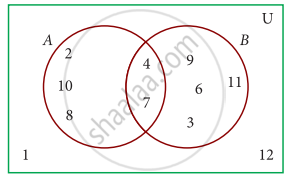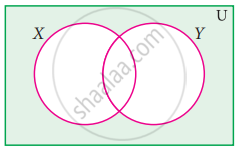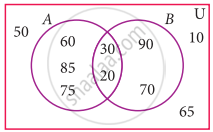Advertisements
Advertisements
प्रश्न
Find A ∪ B, A ∩ B, A – B and B – A for the following sets
A = {2, 6, 10, 14} and B = {2, 5, 14, 16}
उत्तर
A = {2, 6, 10, 14} and B = {2, 5, 14, 16}
A ∪ B = {2, 6, 10, 14} ∪ {2, 5, 14, 16}
= {2, 5, 6, 10, 14, 16}
A ∩ B = {2, 6, 10, 14} ∩ {2, 5, 14, 16}
= {2, 14}
A – B = {2, 6, 10, 14} – {2, 5, 14, 16}
= {6, 10}
B – A = {2, 5, 14, 16} – {2, 6, 10, 14}
= {5, 16}
APPEARS IN
संबंधित प्रश्न
If A = {6, 7, 8, 9}, B = {4, 6, 8,10} and C = {x : x ∈ N : 2 < x ≤ 7}; Find: B - (A - C).
Using the given Venn diagram, write the element of A ∪ B
If U = {a, b, c, d, e, f, g, h}, A = {b, d, f, h} and B = {a, d, e, h}, find the following set
A’
Let U = {0, 1, 2, 3, 4, 5, 6, 7}, A = {1, 3, 5, 7} and B = {0, 2, 3, 5, 7}, find the following set
B’
Find the symmetric difference between the following sets
P = {2, 3, 5, 7, 11} and Q = {1, 3, 5, 11}
Using the set symbols, write down the expressions for the shaded region in the following
Let A and B be two overlapping set and the universal set U. Draw appropriate Venn diagram for the following
(B – A)’
If B ⊆ A then n(A ∩ B) is
From the adjacent diagram n[P(AΔB)] is
In a class of 50 boys, 35 boys play Carrom and 20 boys play Chess then the number of boys play both games is
